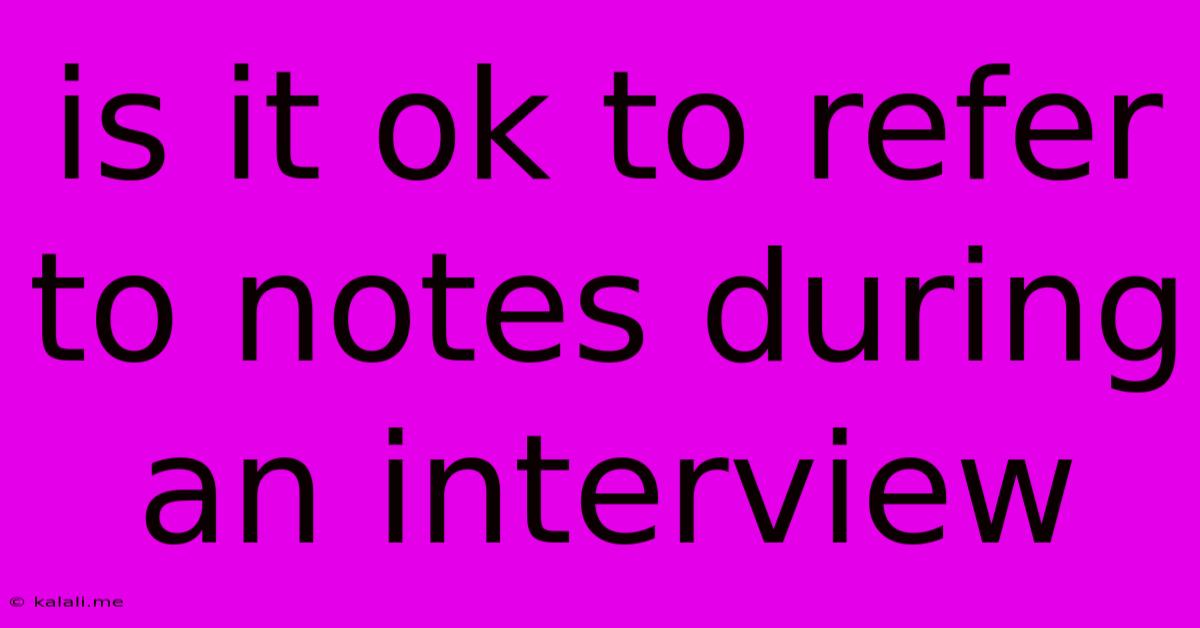Is It Ok To Refer To Notes During An Interview
Kalali
Jun 04, 2025 · 4 min read

Table of Contents
Is It Okay to Refer to Notes During an Interview? A Comprehensive Guide
Meta Description: Unsure if bringing notes to a job interview is appropriate? This guide clarifies when notes are helpful, what to include, and how to use them effectively without appearing unprepared. Learn how to navigate this tricky interview scenario and boost your chances of success.
Landing a dream job often hinges on acing the interview. Preparation is key, and for many, that includes compiling notes. But is it okay to refer to notes during an interview? The answer isn't a simple yes or no. The appropriateness of using notes depends heavily on the context, the type of interview, and how you utilize them. This article explores the nuances of this question, providing actionable advice to help you make the right decision.
When Notes Can Be a Valuable Asset
In many situations, referring to notes can actually enhance your interview performance. Here are some scenarios where well-prepared notes can be beneficial:
-
Behavioral Interview Questions: Behavioral questions ("Tell me about a time you...") require reflection and specific examples. Jotting down a few key experiences and relevant accomplishments beforehand can help you structure your answers concisely and confidently. This demonstrates preparedness and allows you to provide richer, more detailed responses.
-
Technical Interviews: For roles requiring technical skills, having notes on specific projects, technologies used, or problem-solving approaches can be immensely helpful. This allows you to articulate your technical expertise clearly and accurately, showcasing your proficiency.
-
Questions for the Interviewer: Preparing insightful questions beforehand demonstrates genuine interest and proactive engagement. Having these questions written down ensures you don't forget to ask them, leaving a lasting positive impression.
-
Remembering Key Details: If you’re interviewing for multiple roles or have researched several aspects of the company, notes can be useful in reminding you of key facts, figures, or specific details about the company culture or recent achievements. This shows you’ve done your homework and are genuinely invested.
What to Include (and Exclude) in Your Notes
The content of your notes is crucial. Focus on concise bullet points and keywords, not lengthy paragraphs. Avoid anything that might appear overly rehearsed or robotic. Here's a suggested framework:
- Key accomplishments and relevant experiences: Focus on STAR method (Situation, Task, Action, Result) for behavioral questions.
- Technical skills and projects: Highlight key technologies, methodologies, and quantifiable results.
- Questions for the interviewer: Craft insightful questions showcasing your genuine interest and understanding.
- Company information and research: Note down key details about the company's mission, recent news, or industry trends.
What to avoid:
- Full sentences or lengthy paragraphs: This makes your notes appear stiff and unnatural.
- Rote memorization of answers: Focus on understanding the concepts, not just memorizing responses.
- Anything controversial or negative: Avoid expressing any negative opinions about your previous employers or the industry.
- Irrelevant information: Focus on relevant details related to the specific role and company.
How to Use Notes Effectively (Without Looking Unprepared)
The way you handle your notes is as important as their content. Here's how to use them effectively:
- Keep them concise and easily accessible: Use bullet points or short phrases. Avoid overwhelming yourself with too much information.
- Glance at your notes, don’t read them verbatim: Use them as prompts to trigger your memory, not as a script.
- Maintain eye contact: Look at the interviewer most of the time; glancing at your notes should be brief and infrequent.
- Be natural and conversational: Don't let your notes disrupt the flow of the conversation.
- Show enthusiasm and engagement: Even with notes, maintain a positive and enthusiastic demeanor.
When Notes Might Be Less Appropriate
While notes can be helpful, there are instances where they might be less appropriate:
- Very informal interviews: For casual coffee chats or networking events, notes might appear overly formal and less engaging.
- Interviews focused on personality: If the interview focuses heavily on personality fit and cultural alignment, excessive note-taking might overshadow your genuine personality.
Ultimately, using good judgment is key. Trust your instincts; if you feel notes will hinder your natural conversational flow, it’s perfectly acceptable to leave them behind.
Conclusion
Referring to notes during a job interview can be a strategic advantage, especially when addressing complex questions or showcasing technical expertise. However, it's crucial to use them strategically and subtly. By focusing on concise, well-organized notes and practicing a natural, conversational approach, you can leverage the benefits of preparation without appearing unprepared. Remember, the goal is to showcase your skills and personality, and your notes should support – not overshadow – that goal.
Latest Posts
Latest Posts
-
Sun Dried Stucco Color On Walls
Jun 06, 2025
-
4 Year Old Does Not Responding To Questions
Jun 06, 2025
-
What Is The Opposite Of An Acid
Jun 06, 2025
-
What Does Sudo Do In Discord
Jun 06, 2025
-
Receiving Mail For Someone Else At My Address
Jun 06, 2025
Related Post
Thank you for visiting our website which covers about Is It Ok To Refer To Notes During An Interview . We hope the information provided has been useful to you. Feel free to contact us if you have any questions or need further assistance. See you next time and don't miss to bookmark.